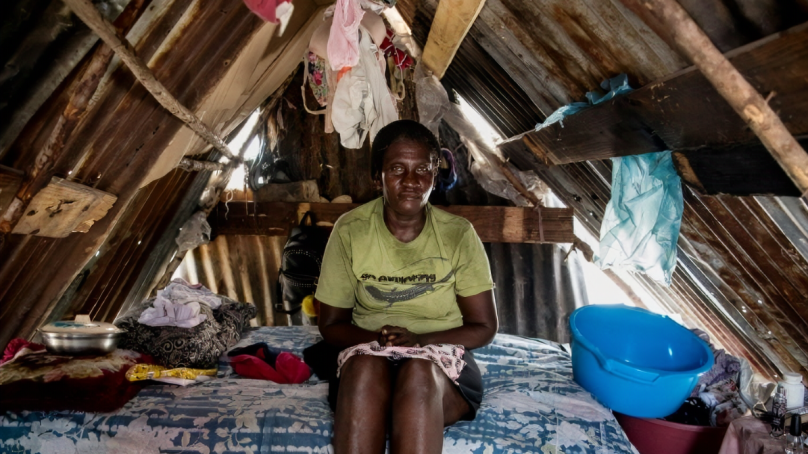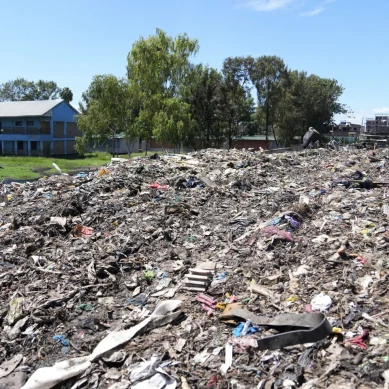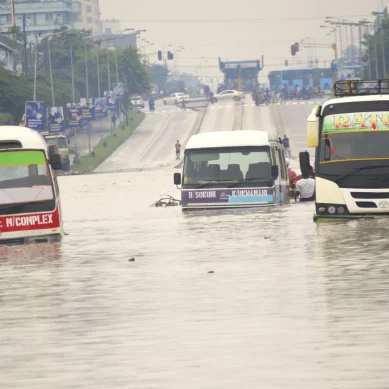
While women are forcibly recruited io criminal gangs, others reluctantly join for protection or work, earning money by collecting information or stealing from homes, according to women who have fled gang-controlled areas and others working in such places who spoke on condition of anonymity out of security concerns.
Some women have formed their own gangs or affiliated with others, often with deadly consequences
In April 2022, 17 women who called themselves Baz Koko Fè or “Iron Pussy” and were affiliated with a gang called Chen Mechan, or “Evil Dogs”, were allegedly raped and killed by the 400 Mawozo gang, according to the National Human Rights Network.
“Their entire world has shrunk to the space that [is] totally controlled by the gangs. There are effectively no paths beyond this world, and so the only way to make a living is to engage in this insular world that was created,” said Sasha Filippova, senior staff attorney at Institute for Justice and Democracy in Haiti, which partners with BAI on legal cases.
Madeline, who was reunited with her six children shortly after Baptiste’s killing, now sleeps among some 3,000 people living in the Plaza Hugo Chávez, an open-air public park in the capital a short walk from the international airport.
Ever since a young girl was raped by a gang member who walked into the camp, she says she sleeps with her legs draped over her five daughters.
Although the alleged perpetrator was caught, the family asked that he be released, too fearful that he or other gang members would target the family, Madeline said, adding that the little girl hasn’t spoken since the rape.
Spontaneous displacement sites have mushroomed across the capital, but since none are official sites, services and support have been sporadic. In some of the camps, more than 60 per cent of the displaced are women and girls.
Giuseppe Loprete, a former country director of the UN’s migration agency (IOM) who left Haiti in September, said the conditions are unimaginable.
“It’s too out of control to allow for a proper response,” Loprete said.
The IOM added that any decision about informal displacement sites or the creation of formal sites would be made by Haitian authorities. Lawyers have been assisting women who have reported rapes, sexual assaults, or exploitation at the Carrefour site – a gymnasium that once held more than 1,000 people but closed in July – according to Mario Joseph, who heads BAI.
In more than 30 testimonies, some alleged abuse was at the hands of local aid workers or government officials, according to Joseph, who said neither UN agencies nor the Haitian government are taking action to address the problem. He added that because of insecurity, they have not been able to follow up with the women.
So far, formal displacement centres are being seen as a last resort, Jerry Chandler, the general director of Haiti’s civil protection agency, said.
“The orders I have is to make sure that people are not encouraged to be in these shelters or camps,” Chandler said, suggesting they didn’t want people to become dependent on resources offered in camps that were hard to provide.
The agency saw its budget cut in half this year to just $417,000, even though the country is still coping with tens of thousands displaced by an August 2021 earthquake that killed more than 2,200 people in the country’s southern peninsula.
Although there has been little appetite for another UN peacekeeping mission in Haiti – some 10,000 cholera deaths were linked to the last one – aid organisations have been one of the few lifelines for women, providing food and medical care despite challenges.
The UN, meanwhile, has struggled to fund its operations, with UN envoy Helen La Lime warning of a “humanitarian catastrophe”.
According to UN figures, some 4.9 million of Haiti’s 11 million population are already in need of humanitarian aid, and those numbers are expected to increase.
“We’re in a crisis situation right now,” said Filippova, from IJDH. “It’s very important for aid as a general rule not to bypass the state, but the government is unwilling to provide it. I think providing safe spaces with meaningful assistance is really, really critical.”
Angélika* said she lost all four of her children to gang violence, including her daughter, who was raped and killed in July. Some victims and humanitarian workers revealed that some gang leaders use their authority to take the virginity of any young girl in his territory.
And while rape is a daily occurrence in many of these disadvantaged neighbourhoods, the increase of armed groups heightens their vulnerability to physical attacks.
“Women’s bodies are weaponised,” said Ducena, of the National Human Rights Network. “It’s a symptom of the trivialisation of rape.”
“We are in a multidimensional crisis in Haiti,” said Pascale Solages, co-founder of the women’s rights organisation, Nèges Mawon, who had to flee Haiti last year because of threats and now works with Haitians in New York. “When you are in a political, economic and social crisis, the women pay a really high price.”
Solidarite Fanm Ayisyèn (SOFA), a Haitian organisation that provides medical, legal, and social support to survivors of abuse in gang-controlled areas, said their services have also been curtailed by the violence, which has contributed to fuel shortages and amplified humanitarian needs.
“When you are in a political, economic and social crisis, the women pay a really high price.”
Such levels of gang violence haven’t been seen in Haiti’s history, but women have long fought for rights and protections. Rape was originally used as a weapon of control before Haiti gained independence in 1804, largely by colonial powers that enslaved the population and pillaged the land.
It has only been recognised as a crime in Haiti since 2005 and although Moïse was set to adopt a raft of new measures that would have given women more protections – including the legalisation of abortion – no new changes can be adopted until elections.
“Women need everything right now… water, food, safe shelter, psychosocial medical care, and prophylactics to prevent pregnancy and the transmission of sexual diseases,” said Filippova. “And it’s urgent. The situation is getting worse, not better.”
*Names have been changed for security reasons.
– The New Humanitarian report











